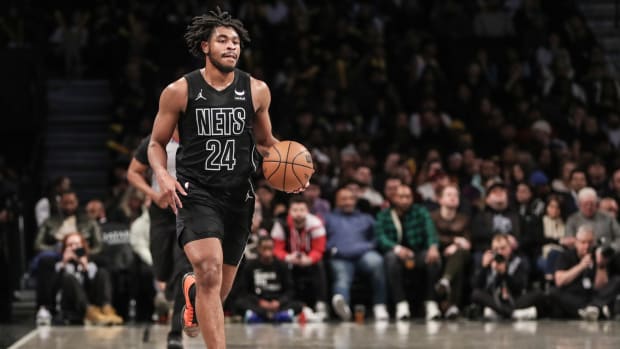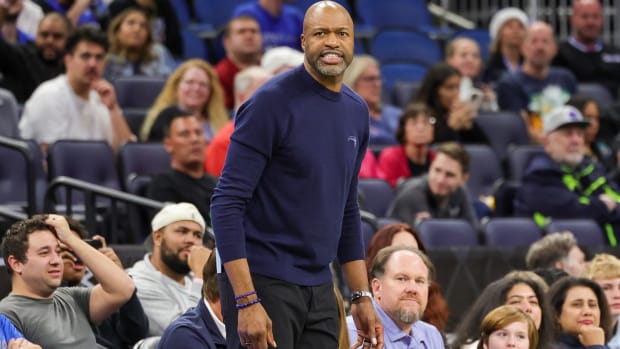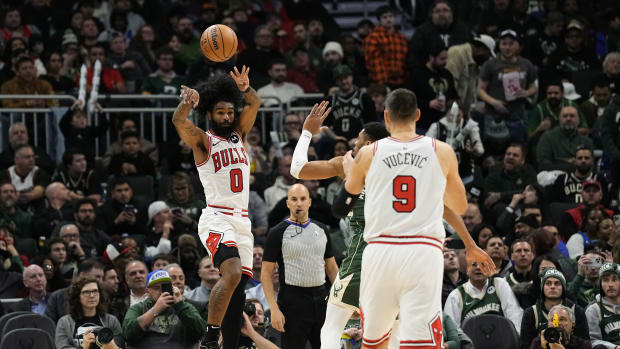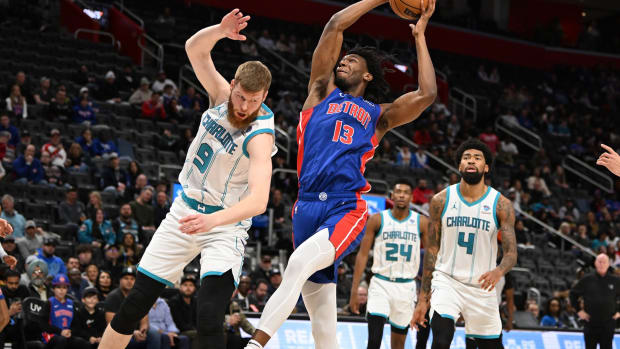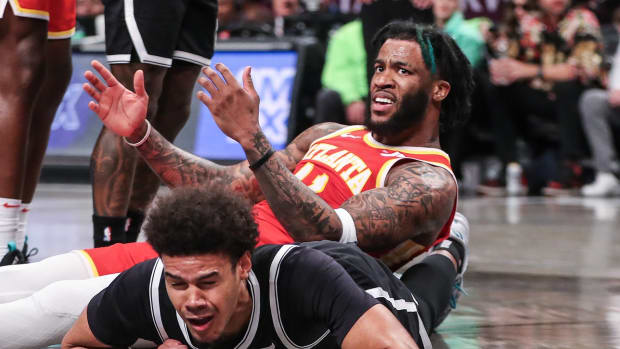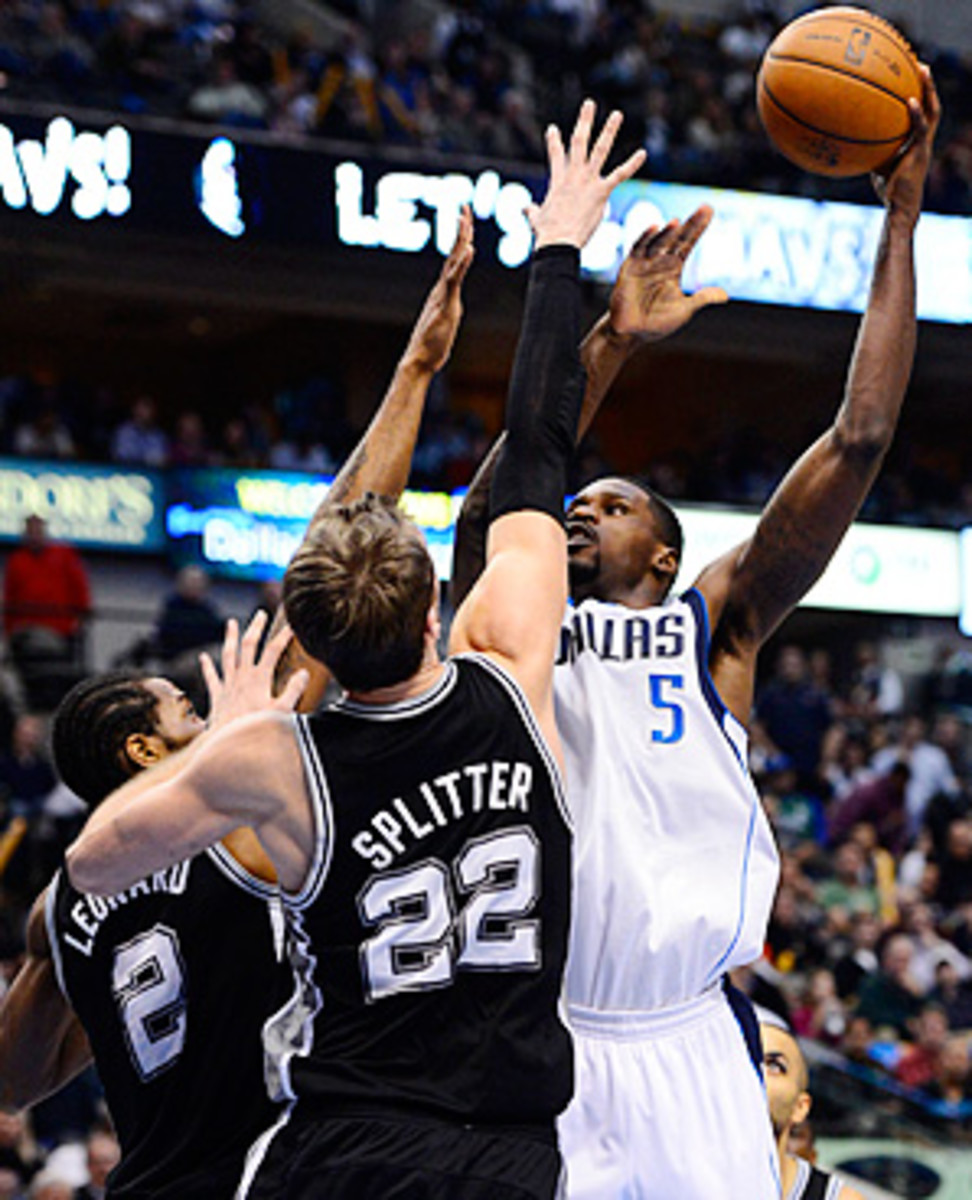
Bernard James discusses path from Air Force serviceman to NBA rookie
The Mavericks opted for a unique prospect with the 33rd pick in the 2012 NBA draft: a 27-year-old high school dropout, late basketball convert and Air Force staff sergeant.
One could hardly stray more from the beaten path to the NBA than Bernard James did. But the 6-foot-10, 240-pound forward-center has become a solid defensive contributor as a rookie in no small part because of the twists and turns of his life.
Chief among them: James' decision, at age 17, to join the armed forces. Not only did that choice help shape him as a person, but it also introduced him to the world of competitive basketball. James is a product of his time in the Air Force in the truest sense, as his personal and professional development can both be traced to six years spent in service of his country, including deployments to Iraq, Kuwait and Qatar. The Air Force gave James a home, a job and an almost inconceivable shot to compete in the best basketball league in the world.
James, now 28, is averaging 3.7 points and 3.6 rebounds in 12.3 minutes for the Mavericks, who have used him as a starter in five of the last seven games while center Chris Kaman recovers from a concussion. The former Florida State standout has five games with at least three blocks.
SI.com caught up with James recently to learn more about his journey and experiences, and his transition to the NBA.
SI.com: Being older than a typical rookie and having followed such an unconventional path to the NBA, do you feel like a rookie?
Bernard James: Yeah, the vets make sure to make me feel like a rookie every single day. I'm still learning the NBA game, so even outside all the hazing, I do still feel like a rookie.
SI.com: When did you first realize that the armed forces might be a good path for you?
James: I guess around 13 or 14, when I was starting to develop into my own person and figure out who I am and who I wanted to be. I'm from a military family, so that's what I was already used to and that's when it popped in my head that it was an option and I thought that I may want to do that. I was actually in JROTC [Junior Reserve Officer Training Corps] for a little while in middle school and high school.
SI.com: And why the Air Force? What about the Air Force spoke to what you wanted to do and the person you wanted to become?
James: The way my dad broke it down to me is quality of life. There are a bunch of small things, too many to really pick out now, but the overall quality of life is better in the Air Force than other branches. You get a lot more responsibility earlier on, so you're not just a robot out there. You can progress in your career faster in the Air Force than you can in many of the other branches. And when you deploy, typically it's shorter. You'll deploy more frequently, but it's shorter than the Army. They'll go for 15-16 months at a time. Air Force, we go from like six months to eight months, but we'll go every other year. It'll be once every three years in the Army, or something like that.
SI.com: Did you find all of those considerations to be true during your time in service? Or would you make a different decision if given the chance again?
James: Definitely -- everything was as expected. I saw some pretty cool places, but I didn't get cushy deployment spots like some of the Air Force guys do. It was all good, though. I got to see how they operate and how they do things, met a lot of good people and worked for some good people, too.
SI.com: People talk about the first time you get dunked on or get your shot swatted in the pros as your "Welcome to the NBA" moment. What was your "Welcome to the armed forces" moment -- that time where you really realized what you were going to be in for?
James: My first deployment to Qatar, the first day out there we had to lay a 6-foot wall of sandbags. It was like 120 degrees outside, so that was fun. Man, it took about two-and-a-half, three hours, and I'm going through a giant bottle of water every 15 minutes or so. It was crazy.
SI.com: I heard that in one of your deployments -- I believe in Iraq -- you were guarding detainees. Is that right?
James: Yeah, that was Iraq. It was my whole team. We were all doing the same thing. Actually, I think the detainees -- they hated me more than most. They put a target on me. A lot of [the detainees], they'd be like, "You! I'll beat you up!" [James pounds his fist against the palm of his hand, mimicking the gesture from the detainees.] They would tell me that like every day. I think it was just that they were trying to pick on the biggest guy, but it was actually pretty funny. Their English was broken, some of them, so they would say some pretty funny stuff.
SI.com: My understanding is that you didn't play a lot of basketball coming up through school. What was the process like of picking up basketball in the Air Force and building your game from scratch at that age?
James: I honestly didn't think too much of it. I didn't think it was ever going to lead to this. I was just playing because I didn't have anything better to do and I'm a competitive person. All the other guys on my base were playing and I didn't want to be the one sitting out. Then, once I started playing, it was like, "OK, well, I don't want to be the reason why we're losing games." That was kind of the whole motivation to begin with, and then more opportunities kept coming, more people kept coming saying, "Hey, we want you to play for this team." I was like, "All right, sure, let's go." That led me to college and led me here.
SI.com: How did your college recruiting process go? I'm guessing you didn't have the same opportunities in terms of campus visits and communication.
James: A lot of the coaches actually did a lot through my mom -- they talked to her and she felt out the coaches for me. I wasn't really looking at basketball teams too much; I was more looking at the schools and their education programs.
With coaches, she was trying to pick out personalities. She was reading how they were talking with her, how they were dealing with her. That's what she was letting me know, because I really didn't care too much how good the team was. My main focus was getting a degree.
We ended up going with Florida State because Coach [Leonard] Hamilton is just a really great guy. He talked to my mom and basically told her that as long as I'm willing to work hard, he guarantees I'll leave with a degree. That's basically what I wanted to hear. I had been working hard for six years in the Air Force already, so if you tell me that if I work had I'm going to get what I'm going for, then that's all good -- I can do that.
SI.com: Did you go into school knowing what you wanted to study or did you have to figure it out along the way?
James: My first year in junior college, I took an econ class. That was the first class that actually caught my attention. So that's what I ended up pursuing and getting my degree in.
SI.com: I realize the irony of my asking you this after this line of questioning, but does it ever annoy you or do you ever get tired of being "The Military Guy" in the NBA? As opposed to being just a basketball player or a rookie or a second-round pick having a good year?
James: No, I'm proud of it. I had a great time in the Air Force. I learned a lot. I'm happy I could serve my country and give back. Having that label is a good feeling for me. I love to be associated with the military and that military image.
SI.com: The AAU system in this country is messy in a lot of ways. Do you feel like you benefited at all from staying away from that by not playing competitively that early? Or would you rather have started playing at a higher level at a younger age?
James: I think I benefited by not playing AAU, just because a lot of guys who don't make it -- it's not because they're not talented. There are a lot of talented basketball players out there who are not in the NBA and who will never play here, and it's because they've been spoon-fed their whole lives and they don't have to go out and work and earn. AAU does contribute to that, and when you get something in your mind at that young age and it's constantly told to you and told to you, until one day it's like "OK, you've gotta work for it,' a lot of guys don't take that well. And that's why some guys don't make the transition from college to the NBA or from high school to college.
SI.com: Has anything about being in the NBA or being an NBA player surprised you?
James: How much you travel -- how much you're on the road. It's not bad. I like traveling. It's just crazy to me that we can be in four cities in five days.
SI.com: Florida State has a pretty good defense every year, and while I would assume a lot of that has to do with guys like you and good recruiting in general, Coach Hamilton and his staff also get a lot of credit. What did you take away from your time at Florida State in terms of being a good team defender?
James: The importance of trust. Coach Hamilton is big on that family bond between teammates. So with our interactions [among teammates] off the court, I see how important that is to how you play on the court with those guys. I learned how important it is to develop a relationship outside of basketball with your teammates and how much that can really help a team.
SI.com: What is the process like of picking up a new defensive concept in going from college to the NBA?
James: NBA coaches expect you to be a professional and to pick things up quickly. They don't really worry about what system you came from -- they teach you the system here and you're just expected to pick it up and do it. It is a little tough sometimes because you kind of get programmed, especially on defense. You get programmed to react so that you're not having to think about stuff.
[But in coming to the NBA] you've got to forget everything that you used to know and learn all this new stuff and get it to the point where it's natural where you just react to it and you do the right thing within the system. It is a little tough, but with repetition and focusing on it every day, you'll eventually get into it.
SI.com: How do you feel like you're adapting?
James: I'm doing a lot better now. When we first started, it was kind of rough because a lot of the concepts here are the exact opposite of what we did at Florida State.
SI.com: On what kinds of actions?
James: Like in the post, when you're guarding, [the Mavs] say, "No middle." At Florida State, we wanted them to go to the middle.
SI.com: And into the help?
James: Yeah. But here, we don't want them to go middle. We want them to go baseline -- and that's the complete opposite of what I'd always been taught. That was a pretty big adjustment.
[Here's a video example of a play in which James denies the middle to Portland's LaMarcus Aldridge, as instructed by coach Rick Carlisle and his staff. And here's a play in which James allows Golden State's Carl Landy to go middle in the post, the opposite of what the Mavericks want.]
And on our help side [defense], we call it a "base go." The low man on the weak side, he has to come over when a guy's driving from the wing to the baseline -- the [weak-side defender] has the "base go." At Florida State, it was like you'd wait until the last second to go. Here, you go early. So sometimes I'm late because I'm still thinking Florida State, like: "Wait, wait, wait, ah s---, I'm late."
[Here's an example of James correctly executing the "base go" by rotating early against Cleveland's Kyrie Irving. And here's a play in which he tries to wait until the last second to rotate on the baseline, only to give up a dunk to Charlotte's Michael Kidd-Gilchrist.]
SI.com: Do you think that aspect of the scheme is different just because NBA players are quicker, better finishers near the basket?
James: Yeah, definitely. I definitely understand it. You can't wait until the last second because you're liable to get dunked on or give up an easy floater or layup. Something bad is going to happen every time if you try to wait, so you've got to be there early to discourage it and make them throw a skip pass.
SI.com: That definitely seems like it would be counterintuitive as a shot-blocker because I know there can be a gamesmanship in terms of duping a guy into thinking he has an open lane.
James: Exactly. At this level, though, people are disciplined. So even if it's a wide-open layup, guys will still lay it high off the glass or make sure to get the ball up. It's a lot harder to fake guys into getting their shot blocked. In college, it was pretty easy; I got almost three a game off that, just turning my head like, "I'm not paying attention to you," and then going and blocking it.
SI.com: I know you guys didn't run a lot of zone at Florida State, but the Mavs play that matchup zone from time to time. Has that shift been difficult for you?
James: No, not really. I actually don't mind playing zone. We had zone at Florida State; we just sucked at it. We could never get it right as a whole, so we never really ran it that much. But I actually like zone, and the rotations aren't hard. There are only like three or four types of zone, and once you learn those small little tweaks as you go from team to team, you pretty much still have the concept. It's not that bad.
SI.com: Schematics aside, what has been the biggest adjustment from defending in college?
James: Everybody's bigger than me. I'm definitely planning on putting on a couple pounds in the offseason. But I'm just wrestling with guys every game and it kind of wears you down mentally sometimes more than physically. I just have to work on my body and get a little stronger so I can battle a little more.
SI.com: When you're trying to earn minutes, how do you make yourself valuable offensively knowing that you're not going to get a lot of touches?
James: Second chances. Getting on the boards, getting us more possessions, getting put-backs. That's how I make my mark on offense. We've got some really great offensive players in O.J. [Mayo], Shawn [Marion], Dirk [Nowitzki], Vince [Carter], so I really don't focus on scoring too much. I know they can get it done. If I'm wide open, of course I'm going to call for the ball or pop to the ball. But my focus is trying to clean up their misses and defending.
SI.com: A lot is made of this idea of mentorship between younger players and veterans. Maybe Dirk and Chris Kaman don't have the best defensive reputations, but Elton Brand has been a guy who has a long career as a really solid defender. Do you pick up things in playing alongside teammates like that, or learn from them? Or is it one of those things that's a bit overblown?
James: You definitely pick up a lot. Chris may not be known for defense, but offensively he's really good. He taught me a lot, actually, and he worked with me a lot. E.B. taught me a lot, too, and he's been helping me a lot on defense -- trying to teach me little things to help me deal with stronger players. It's definitely big, that mentorship. But it's kind of an awkward situation because I play the same position as these guys. So it's like they teach you, but sometimes they probably don't want to teach you too much -- give away their trade secrets. It's a fine balance. They teach enough to help me and so that I can contribute to the team, but not so much that I could possibly take their spot.































